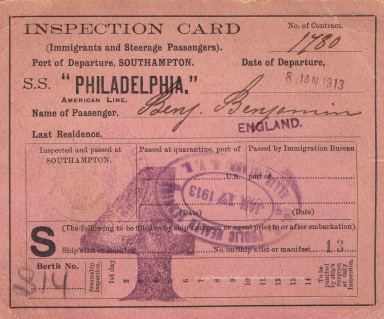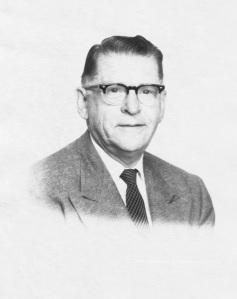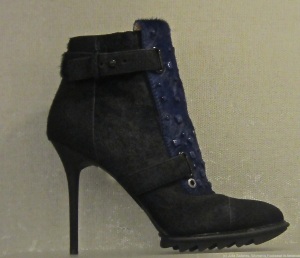The Back Story
February 7, 2014 § 4 Comments

Some of you asked me for more information on my grandfather. Here are the events in his life leading up to the first company he helped start, Sigman and Cohen Women’s Shoe Manufacturers of Brooklyn. The quotes are from tape-recorded conversations I made as a child when he would come over every Sunday for dinner.
I tried to keep it as brief as possible. I’ve always been in awe of his journey from an orphan to a successful American shoe manufacturer. I only knew him as a frail old man, with a tenacious spirit who painted into his 90’s and told his grandchildren that he knew if he learned how to make shoes he would always have a job.
When I was about 8 years old my father decided to go to Belfast. Things were bad. Mother had a lot of children by that time. When I was 8 there must have been 6 or 7 kids. See? I was the oldest. There was a baby boy Harry. He died in Belfast as a baby. Then Aunt Dora was born in Belfast. We lived in Belfast almost 4 years. So I was 12 years old by the time we came back to London. My father got sick and the Dr. advised him to get to a dry climate. Northern Ireland is a very damp country. It could rain for 30, 40 days straight. That’s why it’s called the emerald isle. Cause its green, because it’s got so much rain.
The doctor told his father to go to South Africa, but they couldn’t afford to and returned to The East End of London. His mother, 32 years old was pregnant again and died in childbirth when the baby was only an hour old. His father 36, died 10 weeks later.
Then we were gradually broken up. Those that could help us didn’t want to and those that wanted to couldn’t. That’s the way it went. The Jewish Board of Guardians was a charitable organization run by wealthy Jews in England. They paid for the funeral for my mother and father and later when my brother died – he was 14 in the orphan home, they paid for that, but you couldn’t put up a tombstone unless you paid that money back. After I was here in this country, first time I went back to London, after I was here 18 or 19 years, went back to pay them off. Give them the money they spent for the funeral and put tombstones up for the three of them.
The Jewish Board of Guardian’s they take boys when they’re 14 and leave school and apprentice them to a trade. So they did that with me and the first place they apprenticed me, they wanted me to go to a cabinetmakers shop where they made furniture. I didn’t like it so much because I had to get up at 5 in the morning. I lived out in the suburbs. I had to go all the way down to London to the East End of London and found it was too much and asked them to get me something else, so they put me in a shoe factory. I didn’t mind it. It was also far and awkward to get to, but there I apprenticed for 5 years. The second year I was supposed to go to another department, see? They didn’t want to put me there. They wanted me to stay in the department I was in cause I was doing good there, satisfying them, getting the work done properly. There were 12 apprentices, it was a big plant. I said no, I’ve got an apprenticeship. I’ve got my Indentures, which is the papers that you sign to work there for 5 years and I’m suppose to go and learn this and you wouldn’t teach me that, so I left. I found myself a job in some other factory, but they forced me back. They made me come back on the promise you live up to my agreement. Did they live up to your agreement? Yes they did.
I had an old school chum and he was talking to the superintendent of a factory in Harrisburg Pennsylvania and he sent me a letter to come over there. That’s how I come to go.
I had my struggles the first 2 years, see? Until your grandmother was pregnant with your father. Then she says we gotta settle down because I was going from one town to the other. As soon as I had a job, earned some money, saved up a little, I spent it on railroad fare.
You can’t travel around with a baby coming. We settled first in the Bronx. We had this one room furnished apartment and I found myself a good job cutting pocket books. Bags. Never did it before in my life, but it was good money. Made more money then I could in the shoe factories. There were seasons in those days for every trade and when the seasons finished the shoe factory started to get in business. I saw an ad for a job in Brooklyn. I went over to Brooklyn to apply for the a job in this factory and I got the job. I liked it so I said to grandmother, I says lets move to Brooklyn. I was still Penny Pinching. I didn’t have any money. I had no money to even buy a baby carriage to take him out in the air. There was a little park near us then and we use to carry him in our arms over to the park and we use to sit on a bench so as he had fresh air or make a bed for him on the bench. Your Dad.
All I was trying to do was striving all the time to get enough, earn enough money to get the necessities of life.
Then I had the opportunity to get a job in another factory where the owner was an Englishman and I got the job there cutting shoes and wasn’t working there very long when the owner sent up with his secretary a note that I should come to his house. He wanted to know what my experience was in the trade. He wasn’t satisfied with the Forman of that dept. He told me he wanted to make me foreman there, see?

Courtesy of the Library of Congress: New York from tower of Brooklyn Bridge, Date Created/Published: [between 1907 and 1915] Call Number: LOT 7163 [item] [P&P]
He says to start I’m going to make you assistant foreman. He wanted to know whether I could make patterns and I said yes. I learned all that in England. How to make patterns, how to draw sketches and things like that. So he says I let you know whenever I’m ready. Well it took about 4 or 5 months before I heard another word from him. Then they called me down and told me they were going to make me assistant foreman. Well the foreman didn’t like it, so in a few months he quit and I became Forman.
_

Source:http://baltimoreshoeseum.com
_
I was very friendly with the other foreman. There was one foreman who was in the packing room, he and another foreman in a factory 2 blocks down the street (DeKalb Ave.) wanted to go into business with this other man named Cohen. He was a foreman in charge of Heeling in that particular factory where he was working in. He wanted to know whether I’d help them pick out the last and make their first patterns for them.
Click here to see the converted prewar shoe factory now condos.
I knew all about the layout of the factory. So I said all right. I’ll help you out. I says I’ll make your patterns. I’ll even cut your samples. At that time they were making boots. 9 – 10 inch boots, some with buttons, some laced and it was quite a job to do. You have to draft the last first. See you’ve got so many different style last, high heels, or low heels and the pattern has to be made differently from a lower heeled last than a higher heel, and I did all that. I even cut the shoes. I said you get them stitched and fitted somewhere else. I can’t do no more. They rented a small loft. Enough to make 200 pair of shoes a day. I went over there and I laid out the plan for them. Showed em where to lay it out. What to do. What machines go here and what machines to buy there and said you’re on your own. They somehow got lost. They didn’t know what do. Would I come in with them? I said I’ve got no money to go into business. They said we’ll give you some stock and well lend you some money to buy more stock when you come in with us. So I figured it out and finally decided to do it. Chance to break out. I told Mr. Albert I was leaving him. He says I don’t want to stop you from getting on he says but you got a tough road ahead of you, see to build up a factory in these days. I said you took a chance, I said I want a take a chance, and I did.
…and some things never change. While walking through Bloomingdales recently I spotted this DKNY boot reminiscent of the boots my grandfather made.
I also remember my dad had kept a sample of a boot from the early 1900’s in his hone office. I wonder now if that had been one of the original boots my grandfather had designed.











This is a fascinating chapter of your family history, Julia. I also ejoyed watching the home movies and think you can count yourself lucky to be able to rely on these old documents.
LikeLike
I appreciate your comments. Thank you so much for reading and taking the time to watch.
LikeLike
Liking history this was interesting. My Grandfather was the principal in Wasco> which made jewelry in New York City at about the same time. I wonder if these two men knew each other? Million to one shot.
LikeLike
Thanks for checking out my blog Barry. I enjoyed reading your stories. You never know. I’d love to hear more about your grandfather too.
LikeLike